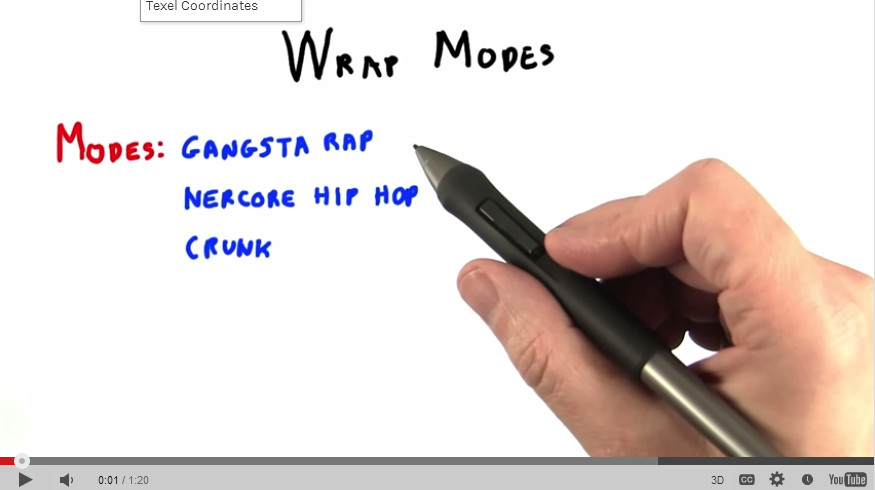OK, this post is most definitely non-graphical, but I need to rant a bit.
While I wait for the last few elements of the MOOC I worked on to be released, I’ve been reading various opinions on MOOCs. Here’s the one theme that drives me crazy on a number of levels:
One of the dirty secrets about MOOCs — massive open online courses — is that they are not very effective, at least if you measure effectiveness in terms of completion rates.
That’s from a NY Times article, which is otherwise fairly positive. I’ve seen this opinion expressed a number of times elsewhere, and it’s meant as a serious critique or a dismissive gesture. From what I’ve read, it’s true that the completion rate is around 5% to 15%. However, it’s an apples to orangutans comparison to equate this with completion rates at colleges. Here are just a few obvious explanations.
The barrier to entry is low: “So, people who pay, or whose parents pay, $500 to $5000 per course are more likely to complete that course than those who pay $0? Shocking!” Say I have two computer programs I could use for a task. One costs $0, one costs $5000. I’ll certainly look at the $0 option first. If I paid $0, no big deal if I stop using the program. $5000, and I definitely am committed to use the program in a serious way, I want to get my money’s worth so I’ll make sure I need it and use it. But, really, this kind of misses the point. No one’s really weighing today’s MOOCs vs. traditional college curricula, for one obvious reason:
You’re getting just knowledge, not course credit or a QPA, nor even any parties: There’s a huge group of people ages 18-22 that go to college. They’re all there to get a degree, along with an education. Take away the degree aspect and most parents are not interested in plunking down the cash. Even alternatives such as Hampshire College produce an elaborate transcript for their students and some “proof of learning”. Take away the “meeting other students” aspect and that removes a significant aspect of the college experience for students: no dorms, no sports, no clubs, no parties, on and on. Comparing MOOCs with colleges is just silly. The main question that should be asked is “how do various MOOC techniques fit in with college education?” Flipped classrooms is the obvious one, and so how else can college education be improved? We don’t make every faculty member write their own textbook for each course they teach. What improvements can be gained by sharing more elaborate forms of media and interactivity for education? Articles such as this help.
Students who finish want to be there: That’s the dirty little secret of MOOCs. People are taking them because they want to, not because they have to. The main motivator is, “I want or need to know about this subject.” Since sign-up is free, there’s then all the things that will whittle down that number: “I was just curious what the course looked like” (there’s a huge percentage, maybe 40%, that never take a single class), “I thought it’d be fun, and it was at first, but then it got hard”, “I already knew most of the material”, “I learned the bits I wanted to know and never bothered to complete the course”, “the lecturer was boring/the course disorganized/the materials poorly presented/etc.”
I could go on, but I think you get the idea. The completion rate is a distraction and misses much of interest. It makes for an attention-grabbing fact but not much else. If you think about it, it would be downright bizarre if a free course open to all had a 90% completion rate. That would be the most amazing course ever, that it would be so compelling to almost everyone that signed up for it.
A MOOC can be thought about in another way. What if you told a professor, “every student taking your class is there because they want to be there, they want to know what you have to teach them”? That would be a dream come true. My humble course has 22K signups currently (many “name-brand” MIT, Stanford, and Harvard-backed online courses have over 100K students). Say just 1100 (5%) complete the course, and just 220 (1%) really loved the subject. 220 inspired students? I’ll take it! Heck, I’ll take 22. That may well be more truly inspired students than many teachers get a chance at in their careers. That’s a major reason many professors are excited by MOOCs and push to get their courses online through their universities. Getting messages from students such as, “in my country I think we don’t have schools making this kind of Course” is certainly fulfilling for me.

Hi! I’m someone curretnly trying to follow your course, I haven’t been able to complete it yet, I’m trying to familizarize myself a bit more with javascript first, to do the exercises. It’s definitely well presented and interesting. Keep up the good work!
Don’t know if you’re reading the comments or not. . .
I did signup on Udacity for this course. However, if javascript is the main theme and I cannot use C++ I may be forced to drop it.
On another note, I believe Georgia Tech is offering an online Master’s Degree via Udacity, which I think is an excellent idea (http://chronicle.com/article/Ga-Tech-to-Offer-a-MOOC-Like/139245/?cid=gs).
Is an online doctoral program valid? If someone does all the work, should they be awarded the degree or is there a cutoff?